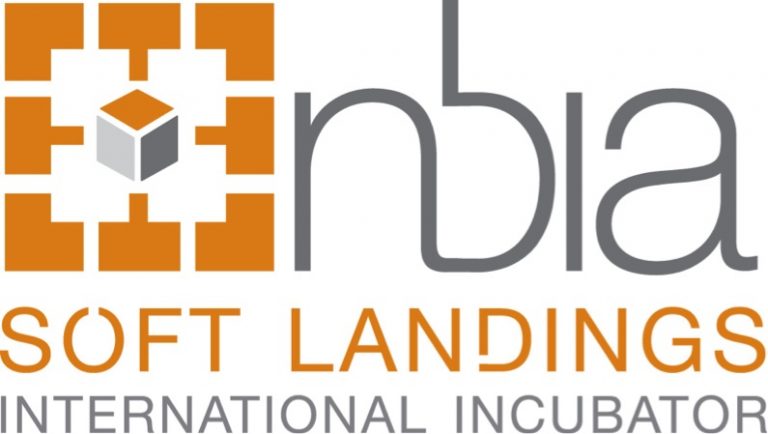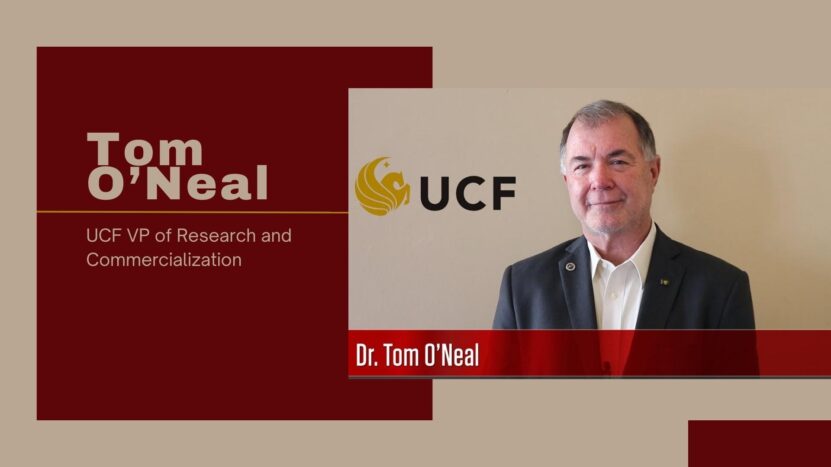You will find him on nearly every board or influential committee that is working on business development in Central Florida. Dr. Tom O’Neal, UCF’s vice president of research and commercialization, is recognized throughout the region as a pioneering innovator and the founder and executive director of the UCF Business Incubator Program and the Florida Economic Gardening Institute, known as Grow FL. Since 1999, it has helped hundreds of companies create over 2,000 new jobs, which have had an annual economic impact of over $510 million, with an average salary of $59,000. The program is staffed with a team that includes business analysts, marketing and public relations specialists, program and process/systems managers, all
I4B: What personally drew you into the arena of business development?
TO: I came to UCF to work at CREOL, the Center for Research and Education in Optics and Lasers. I was an electrical engineer with an MBA and got involved in starting a company with a faculty member, and then a second business with another member of the faculty. It was at that point that I began to consider this notion of starting a business incubator; that was in October of 1999. Of course, not everyone understood what we were trying to accomplish.
In the beginning, I had no idea it would get this large. Initially, I thought, ‘If we got 30 companies that would be great.’ We’re working with 130 companies right now and any day we are going to graduate the 100th company that has gone completely through our program. One day, we will have more graduates than clients.
I4B: Aside from your own business start-up experience, what was the catalyst for the incubator program?
TO: Most scientists and engineering folks that are academically centered don’t necessarily know how to run a company. So, what are you going to do to give them a better chance of succeeding and create value for the community? My fundamental notion was that the greatest technology in the world doesn’t do anyone any good if it stays in a lab — or even if it moves to a patent stage — or is put on a shelf, in what I call a ‘Pawn Shop’ model, hoping someone will come along and bring it to market.
I ended up doing my doctoral dissertation here, and I looked at economic ecosystems and discovered that incubators filled a gap in ecosystem development. People began to realize that jobs are created by entrepreneurs, so if you increase or her success rate —
everyone wins.
I4B: Describe how the process you have developed here works.
TO: We created a “venture lab,” which helps with the front-end work — where you see if your baby is ugly or not.
I4B: Sort of a “Shark Tank?”
TO: Well, we do a lot of market research and vet them with local industry experts, as well as provide guidance and coaching during the initial stages. Our goal is to match technology creators with CEOs and CFOs so that they have the best possible chance for survival and initial-stage growth. Grow FL then comes in on the back-end to help continue to nurture its growth, from the 10th up to its 100th employee.
I4B: What do you look for in technology or in a person with a business idea?

TO: I realized right away that in an hour you could sell me on anything (laughing). So, we developed a course called “Excellence In Entrepreneurship.” It takes four weeks, two nights a week for three hours, and the intensive concludes with the participants making a formal presentation of or their business opportunity.
I4B: I would think it is sort of self-vetting?
TO: It is; the ones that we would reject usually realize it before the course is over. The most telling quality is ‘Are they coachable? Do they want to be incubated or do they just want a place to hang out.’ We also ask, ‘Are they scalable?’ We are looking for companies that are going to grow, and if they are never going to be more than a three- or four-person company, there are other places we can plant them. Typically the research shows an incubation experience doubles a company’s chances of success.
I4B: It seems as though the role of colleges and universities has undergone an incredible change in direction from just educating to actively facilitating economic development.
TO: In the last 10 years, there has been a remarkable change. You look at what institutions like Stanford and Massachusetts Institute of Technology have done for their communities and it is amazing. They are active, and MIT created one of the first venture capital funds. Though it wasn’t totally new, it wasn’t common like it is today. States are investing in education and now they would like to see a direct return on that investment.
I4B: Where did you go to learn?

TO: Initially I studied a lot of incubators. I joined the National Business Incubator Association and went to four or five of its conferences before we opened our doors. The people I was introduced to were very open and very giving — they weren’t competing; they wanted to partner for our success. After studying others, we took their best practices and brought them back here.
I4B: Is this attitude prevalent across the board?
TO: They all have one primary purpose: to foster great businesses. If you produce successful businesses everything else takes care of itself — they create jobs, they bring in capital; it all works when you focus on that one thing. If you just want to create jobs then bring in a call center, but that isn’t wealth creation, which brings in capital from beyond the immediate region.
I4B: Seems pretty self-evident.
TO: It is simple, in a sense. However, if you deal with one entrepreneur you realize it isn’t a cookie-cutter process. You have to do unique triage with each company and help them with the daily problems they face developmentally, giving them tactical and strategic advice. We also train them to meet people. Often, technical people don’t understand that investors and customers won’t initially come to you — you have to go to them.
I4B: Was OptiGrate one of the companies that went through your program?

TO: It was. Leon Glebov’s scientific research brought him to UCF, but once he came, we saw applications for his work in the marketplace. However, he was the last person we thought would start a company. He was from the former Soviet Union and didn’t even believe in capitalism. But we helped him work through the growth stages and to get the right CEO in place — who, as it finally turned out, was his son.
Another one was Dan Rini (RINI Technologies). He’s from Canada. Because of his immigration status, he couldn’t work until he started his own company, and even then he couldn’t pay himself. He came to UCF on a waterskiing scholarship, but he partied so much they kicked him off the team. Then, he got serious and went all the way through to his Ph.D. in mechanical engineering. He was going to go back to Canada to find work and I suggested that he start a company.
He applied to the incubator the same week he defended his dissertation. He began to get grants and his work has taken off. He concentrated on the back-end of the laser problem. Everyone wants to work on lasers, but no one was working on how to cool them. That is where he focused, and he filled a big gap and is doing very well.
I4B: What does a region have to do to create a technology sector?
TO: First, you have to attract the people and the talent and to do that you have to have a world-class university. In 1991, when I came, UCF was just a big community college. We are now a major research university. You attract this intellectual capital; then, you provide an environment where businesses can be developed and bring in venture capitalists to feed the ideas. But it starts with people; venture capital doesn’t fund ideas, but people do.
I have found there are smart people everywhere, but this doesn’t happen everywhere. It requires the right people, at the right time, in the right environment. This area is different than it was 10 years ago and it will be different in another 10. Entrepreneurship has taken over this town, and now, it is a priority. When I arrived, people couldn’t spell the word.


